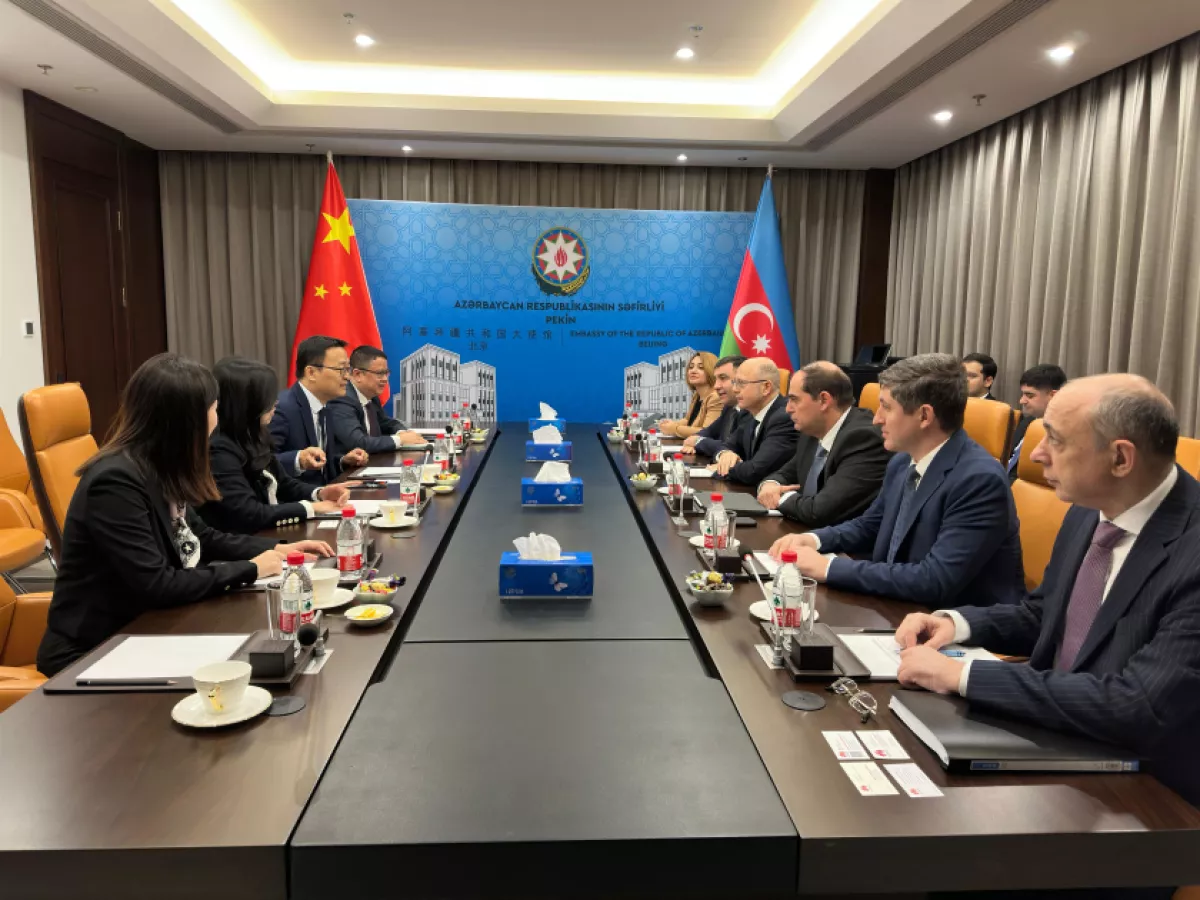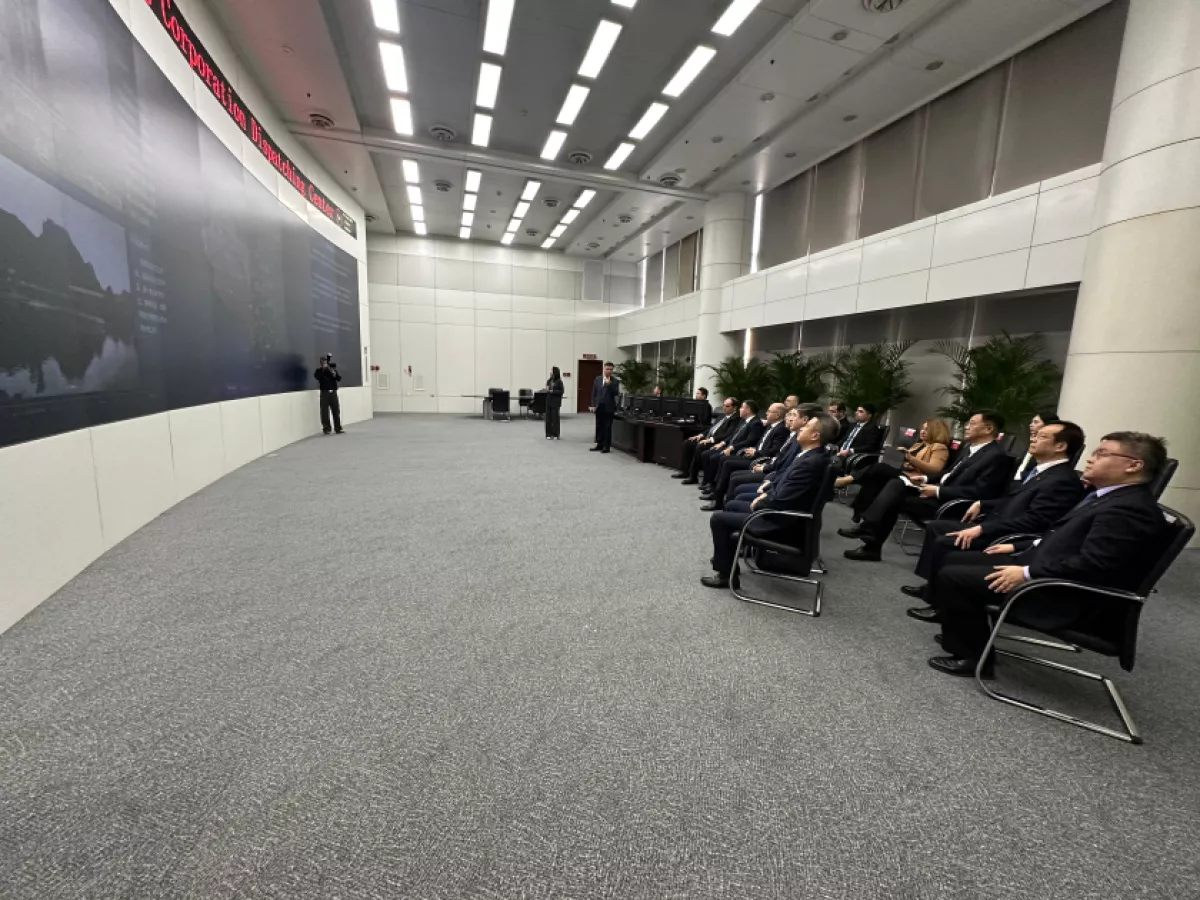Baku and Beijing strengthen cooperation in renewable energy initiatives Green pathways of the Belt and Road
Azerbaijan is actively engaging in global efforts to advance "green" energy development. In collaboration with partners from the Gulf, Türkiye, and Europe, the country is building renewable energy facilities and expanding its electric transportation infrastructure.
In recent years, Baku has deepened its cooperation with Beijing, attracting Chinese investors, equipment suppliers, and technological expertise to boost the renewable energy sector and other parts of its economy. The future of Azerbaijan-China collaboration in the "green" transition was a key focus of discussions in Qingdao, where Azerbaijan's Minister of Energy Parviz Shahbazov arrived to participate in the third Belt and Road Energy Ministers’ Conference scheduled for October 23-24.
While maintaining a strong foundation in the oil and gas sector, the Azerbaijani government is actively implementing global best practices as part of the "Global Energy Transition 2030" initiative. Notably, the country has seen rapid growth in the share of renewable energy in the past two to three years. For example, in 2023, renewables accounted for 12% of Azerbaijan's total electricity generation, compared to less than 10% in 2022. By 2027-2030, this share is expected to rise to 33%, driven by new projects, most of which will be realized through private investment.
Currently, leading investors in Azerbaijan’s renewable energy sector are companies from Saudi Arabia and the UAE. However, there is significant potential for attracting Chinese partners to the country’s "green" energy projects. This approach is well-justified given China’s global leadership in breakthrough technologies for alternative energy and its rapid growth in clean energy capacity.
According to the respected British climate and green transition website Carbon Brief, in 2023, clean energy-related sectors contributed a record $1.6 trillion to China's economy. Moreover, these sectors accounted for 40% of the country’s GDP growth—more than any other economic sector. The most prominent areas of investment in China in 2023 were solar panel production, wind turbines, electric vehicles, and energy storage systems. By the end of last year, China was responsible for 43% of the world’s total installed capacity for both solar and wind energy, with a combined output exceeding 1 TW.

China's impressive records and achievements in renewable energy are numerous, but the most important takeaway is that the country is open to collaboration. China is actively sharing its expertise and is ready to support Azerbaijan in its efforts toward a "green" transition. This commitment to cooperation is underscored by the visit of Azerbaijan’s Minister of Energy, Parviz Shahbazov, to China at the invitation of Zhang Jianhua, head of the National Energy Administration of China. Shahbazov is participating in the third Belt and Road Energy Ministerial Conference, scheduled for October 23-24 in Qingdao, Shandong Province.
The forum, themed "Innovating for a Shared Energy Future," will address key topics such as energy security cooperation, the development of energy markets, technological innovation, and financing opportunities for green energy. Shahbazov is set to deliver a speech at the conference's opening ceremony and will take part in discussions at the forum on "Strengthening cooperation in mutual energy coordination for further diversification of energy supply."
As part of the visit to China, ahead of the conference, Azerbaijan’s Minister of Energy held bilateral meetings with leaders of major Chinese energy companies. A central theme of these discussions was the signing of a declaration of strategic partnership between Azerbaijan and China and the expansion of cooperation in the field of "green" energy. During talks with Lin Xiadon, Vice President of China Energy International Group, key topics included integrating additional renewable energy capacity into Azerbaijan's power grid, implementing offshore wind energy projects in the Caspian Sea, localizing renewable energy equipment production in Azerbaijan, cooperation on "green" energy corridors, and China Energy International’s participation in the construction of a 160 MW solar power plant in Fuzuli.

The parties agreed to establish a working group to deepen collaboration, and Lin Xiadon expressed the company’s intention to increase investments in energy projects in Azerbaijan.
The meeting with Zou Lei, Chairman of the Board of China Datang Corporation Limited, was equally productive. Discussions focused on Azerbaijan’s active participation in the Belt and Road Initiative and the potential for attracting Chinese investment in the energy and transportation sectors. The talks also explored cooperation with China Datang on solar and wind power projects, energy storage, and green hydrogen. On the same day, the prospects for collaboration between Azerbaijan and the leading Chinese company Huawei in the energy sector were also discussed.
"We had a fruitful meeting in Beijing with Lin Xiadon, Vice President of China Energy International Group Co., Ltd. During the meeting, we discussed accelerating the implementation of 160 MW power plants, the company's involvement in offshore wind energy projects and green energy corridors, the local production of renewable energy installations, as well as cooperation in establishing a joint research and development center," wrote Shahbazov on his account on the social network X.
Overall, the Azerbaijan-China partnership on green initiatives is extensive and encompasses various sectors of the economy. With its considerable expertise in solar, wind, and hydropower, China is well-positioned to share these technologies with Azerbaijan and assist in the development of an effective low-carbon energy system. Chinese companies are actively strengthening their partnerships with local energy entities, such as SOCAR Green and Nobel Energy Azerbaijan.
In June of last year, the Ministry of Energy signed a memorandum of understanding with China Gezhouba Group Co., a subsidiary of Energy China, to implement projects in the renewable energy sector. This agreement includes the construction of ground-based solar and wind power plants, joint development of offshore wind energy, as well as the creation of energy storage systems and integrated smart energy systems. Another promising area identified for collaboration is the production of green hydrogen.
A significant milestone in Azerbaijan-China energy cooperation is the involvement of the Chinese company Dongfang in the construction of the 230 MW Garadag Solar Power Plant, as well as in the development of the largest thermal power plant in the South Caucasus, with a capacity of 1,280 MW, in Mingachevir, expected to be operational next year.
Efforts are also progressing in attracting Chinese investments and establishing joint ventures to implement green technologies in the transportation sector. Recently, a framework agreement was signed with BYD Company Limited for the procurement of electric buses and the subsequent localization of their assembly in Azerbaijan, alongside the creation of charging and service infrastructure. Over time, the agreement with BYD aims to establish the production of electric freight and municipal vehicles, with plans to begin assembling energy storage batteries by 2028. Looking ahead, Baku and Beijing intend to implement renewable energy projects with a total capacity of 2 GW.








